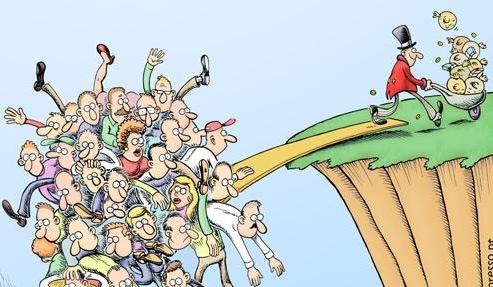At a panel moderated by the Harvard Business Review at the Washington National Cathedral, Christine Lagarde tackles inequality.
Moderator Idi Ignatius, editor of the Harvard Business Review, posed this question: “Is Christian faith incompatible with vast wealth?”
Lagarde, who grew up Catholic in France, parried the question with aplomb.
“I think it’s how you use it, what you do with it, and what purpose you give to your life as a result which really matters.”
Those words echoed her June speech before a Catholic conference in Belgium in which she asserted, “It is not immoral to enjoy one’s financial success.”
Summers, who’s Jewish, drew laughs when he observed, “I hope this is the last time I’m asked to opine on Christian morality,” then agreed with Lagarde:
The discussion of public morality, sustainable economic growth and government policies that encourage redistribution of wealth included themes touched on by Pope Francis during his apostolic visit to the United States in September.
The pope, in fact, was the only religious leader quoted during the evening. Ignatius referred to the pope’s speech in Bolivia July 8: “Let us say ‘no’ to an economy of exclusion and inequality, where money rules, rather than service. That economy kills. That economy excludes. That economy destroys Mother Earth.”
The Rev. Gary Hall, dean of the cathedral, reached back farther in his introduction to the program, quoting from the pope’s apostolic exhortation of 2013, in which he called capitalism “a new tyranny” and called on political leaders to address income inequality.
Lagarde avoided specific observations on the morality of income inequality. “As far as the IMF is concerned,” she said, “we’re not taking a political stand; we’re not taking an ideological stand.” Instead, she said, “we have to ask ourselves, is that good for financial stability? Is that good for sustainable growth?”
She concluded that “excessive inequality is not good for sustainable growth,” adding, “We need to have a moral compass” in government economic policies.

